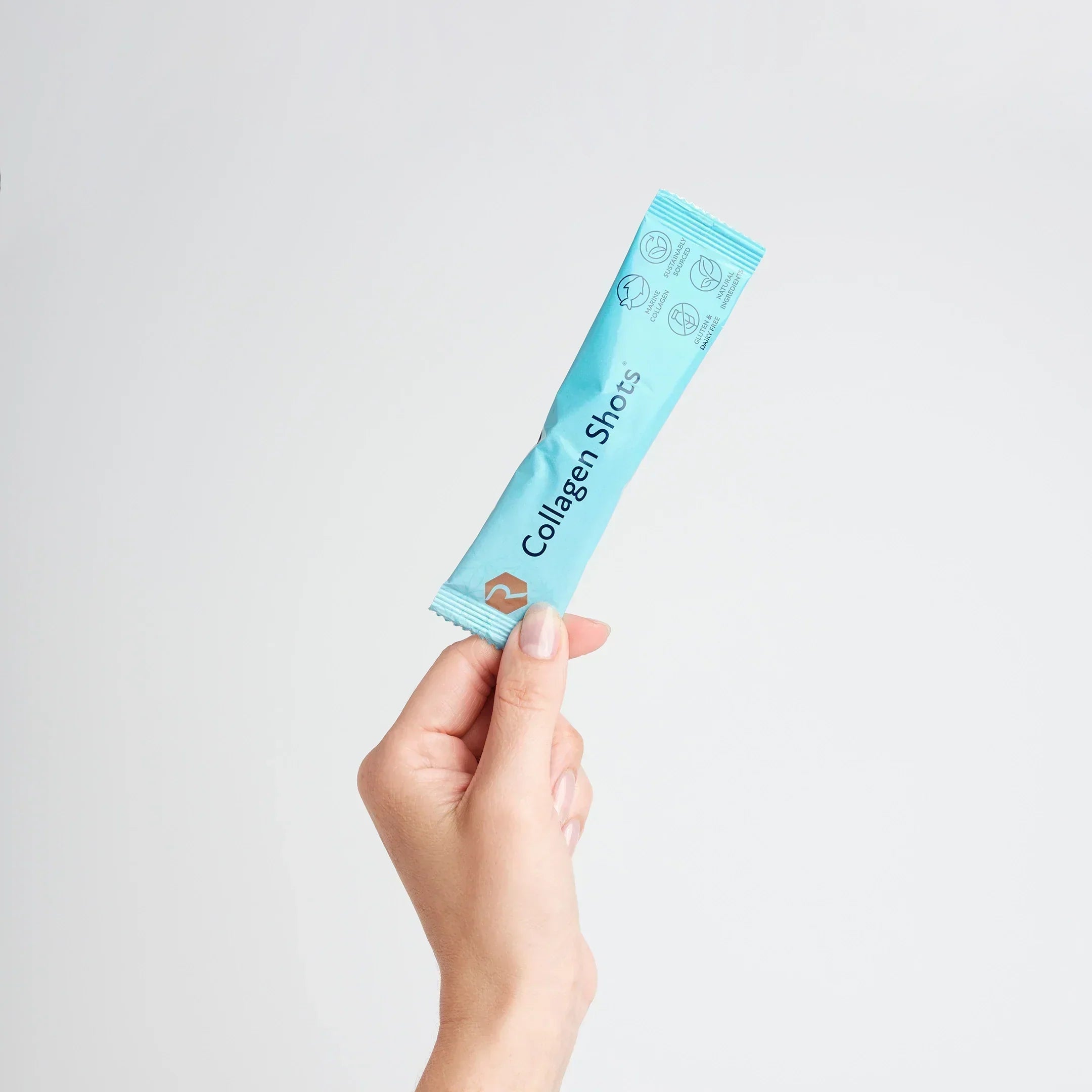How much collagen protein is in the skin?
Collagen actually makes up 75% of our skin and 30% of our total body protein, so it’s easy to see why collagen plays such an important part in the health of our skin.
The name collagen comes from the Greek word ‘kolla’ which means glue as collagen is the key to holding our body together. The dermis layer of skin contains more than 70% of collagen
Types of collagen
Over 28 types of collagen exist, but Types I, II, and III dominate:
-
Type I & III: Found mainly in skin and tendons. Type 1 forms all other collagen in the body
-
Type II: Found in cartilage—key for joint heal
How is collagen protein formed?
As a protein, collagen contains amino acid peptides. These amino acids are formed in a triple-helix of three tightly-wound chains. The chains are predominantly made up of the amino acids, glycine, proline and hydroxyproline. Hydroxyproline is of great importance, as it helps to prevent the break down of the triple-helix structure.
Collagen protein plays a part in the healing of wounds
Collagen helps to balance the level of fibroblasts in the body which in turn synthesise the extracellular matrix and collagen.
Fibroblasts are the main connective tissue cells present in the body and they play a vital role in wound repair.
Why should a collagen supplement be hydrolysed?
Not all collagen proteins are equal, eating steak and fish every day will not have much impact on collagen levels. The average protein molecule in food is approximately 300,000 Da which requires a significant amount to break down via digestion before it is available to the body.
Hydrolysed collagen protein powder, as used in Rejuvenated Collagen Shots, has been formulated to have a specific low molecular weight of 2000 daltons.
Collagen levels start to reduce at the very early age of 25
It’s a fact that once we hit the age of 25, our collagen levels start to diminish by up to 1.5% a year. The reduction in collagen production also affects the production of fibroblasts. Fibroblasts lose their ability to repair damaged structures which accelerates the loss of collagen further including the break down of the collagen matrix.
How much collagen protein should you have per day?
We recommend drinking 10000mg (10g) of collagen per day. That would be just one collagen shot daily. Consuming this dosage of collagen would be impractical in capsule form.
Vitamin C is the key to collagen absorption
Hydroxyproline is created by an enzyme (prolyl hydroxylase) interacting with the amino acid proline. However, vitamin C is required for this interaction and a deficiency of vitamin C can result in impaired hydroxyproline formation. If you are taking the best collagen powder check to make sure that it has a good supply of vitamin C too.
Collagen levels determine the elasticity of the skin
Collagen proteins stimulate fibroblasts which in turn produce the extracellular matrix structural proteins including fibrous collagen and elastin. Elastin gives skin its flexibility, the ability to stretch and return to shape. Over time the elastin in our skin reduces.
Effect of the menopause on collagen
Oestrogen is vital for healthy collagen levels so it’s a fact that once we start to go through the menopause we will start to see wrinkling and a thickening of the skin.
Women have a lower collagen density of collagen than men. Most women look after their skin with more care than men, yet men typically age more slowly. The reason for this is that men at any age have more collagen in their skin than women.
Sugar and sucralose damages collagen
Sugar suppresses the activity of white blood cells making us more susceptible to disease and infections. It also causes a process known as glycation.
The sugar molecules attach themselves to collagen fibres causing them to become brittle and less elastic. The result is hardening and thickening of the skin leading to lines and wrinkles.
Collagen protein increases metabolism
As collagen is a protein, it actually helps the body to metabolise fat more effectively and to create lean body mass.
Can taking collagen help to boost collagen levels in the skin?
Yes, significant studies have shown that orally ingested collagen can increase collagen synthesis and improve collagen levels. Results have shown:
- Reduction in the appearance of fine lines and wrinkles, including crows feet.
- Make the skin appear younger and fresher
- Increases skin firmness
- Improves the elasticity of the skin
- Reduces dryness
- Increases skin smoothness.
Fascia is your body’s secret weapon
Fascia is a fibrous network of collagen which sheathes our organs, wraps around our spine and arteries and encases our muscles and ligaments. In fact, without fascia to hold together our organs, muscles, bones and joints.
Collagen Shots is a multi-award winning beauty drink with youth-boosting properties for the skin and whole body. It contains 10000mg hydrolysed marine collagen powder with added acai berry, vitamin C, hyaluronic acid, copper and zinc.
Collagen Shots comes in 3 versions, a 30 serving pouch, 24 individual sachets and now in a compostable bag within a beautiful storage tin.



















